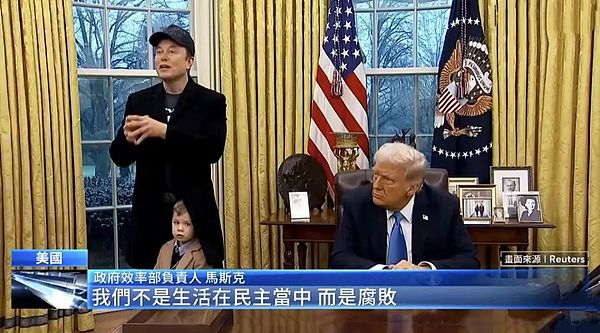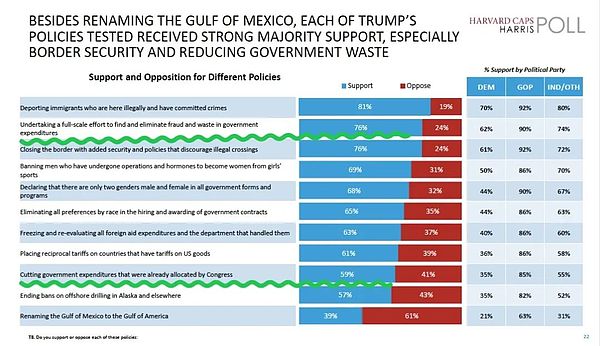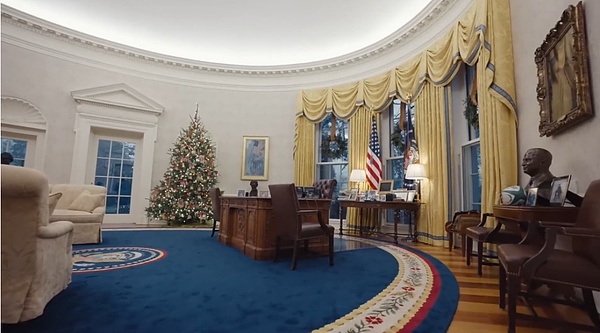Written by Guan Buyu, Source: Bingchuan Think Tank
The frequent "shutdowns" and "closures" of the federal government are the "daily crises" of American politics. Since 1977, the U.S. federal government has "shut down" more than 20 times, ranging from a few days to a few weeks. The script for each shutdown is similar. The differences between the president and the two houses of Congress on the government budget cannot be resolved, and the federal government announced a "shutdown."
Political and economic commentators announced the bad news to the public with a heavy heart, and the pessimistic predictions they made included but were not limited to "social unrest", "national debt default" and "economic setbacks", which made people panic. In the end, the crisis was resolved and the market rebounded. The ups and downs of the capital market made Wall Street earn blood with tears.
It is quite interesting that no matter whether the shutdown lasts for a few days or a few weeks, "social unrest", "national debt default" and "economic setbacks" have never happened in the United States.
The shutdown is a real shutdown, but it is limited to the "non-core departments" of the US federal government. The core departments such as defense, justice, and finance operate as usual. The courts will still be open, and tax collection will not stop.
Therefore, there will be neither "social unrest" nor "debt default". Except for the slight inconvenience caused by the closure of some national cultural facilities such as art galleries, museums, and national parks, people's lives are almost unaffected by the "shutdown". This makes people wonder, what if those "non-core departments" are "shut down" forever?
It is difficult to get a full picture of how large these "non-core departments" that are shut down are. Because most shutdowns have temporary appropriations bills, "non-core departments" have never been completely shut down. The most widespread in history was the "shutdown gate" of the Clinton administration in 1996, when 100,000 federal employees took unpaid leave. This is certainly not all, but it is also quite astonishing.
No one can tell how many employees the "non-core departments" of the US federal government have employed, providing "services" that American citizens do not need. However, the consequences of this are well known, that is, the federal government's finances have become so huge that they are unbearable. In fiscal year 2024, US federal spending increased by $1.695 trillion from the previous fiscal year to $5.742 trillion, and the deficit rate rose from 6.2% to 6.4%. Federal spending as a percentage of GDP increased from 22.5% to 23.4%. High spending and high deficits are once again approaching the debt ceiling. The alarm of fiscal crisis has sounded again.

Picture/Video Screenshot
It is no secret that the United States, founded on the principle of "limited government", still cannot escape the trap of "big government". The American people have suffered for a long time. In every election campaign, balancing the budget, reducing the deficit, and reducing the national debt are the issues that voters care about most. Politicians from both parties have made generous promises, but they have never fulfilled them.
Until the DOGE (Department of U.S. Government Efficiency) team led by Elon Musk broke into the "china shop" in Washington and finally got serious.
Since DOGE was officially established on January 20, it has torn up the Chief Diversity Officers Executive Committee (CDOEC), reduced the U.S. Agency for International Development (USAID) from 10,000 to 300, and vowed to "take action" on more than 10 departments including the Ministry of Education, freezing the recruitment of non-essential positions. This massive wave of slimming operations of the U.S. federal government has undoubtedly caused huge controversy.
Does DOGE have the right to "bring a sword into the room"? Is there a more moderate alternative to Musk's radical "surgery" plan? It is the focus of the debate.
Among the many views against DOGE, the most ridiculous one is "not authorized by the federal government." If the "federal government" refers to civil servants and bureaucrats, it is conceivable that any drastic reforms cannot be "authorized". It is impossible to authorize rapists to castrate themselves.
Fortunately, the U.S. Constitution does not grant executive power to "federal employees". No matter how high the position of "federal employees", they are only executive-level officials who only work for the federal government. DOGE does not need their authorization.
Another reason for accusing DOGE of overstepping its authority is that it "has no establishment" - DOGE is not a formal department of the cabinet. In fact, this is also a misunderstanding of the presidential system of the U.S. Constitution. Unlike many other countries, the U.S. Constitution completely grants executive power to the elected president, which is a major feature of the U.S. presidential system. Under this institutional design, the U.S. cabinet itself is not "formal" and "establishment" is not important.
In order to ensure the integrity of the executive power of the U.S. president, the U.S. Constitution does not clearly define the status of the "cabinet" or the provisions for communication between the president and the cabinet. Therefore, the U.S. president makes independent decisions when formulating and implementing major policies and does not rely on the opinions of the cabinet. The President of the United States is both the head of state and the head of the Cabinet. Cabinet members are only advisors and executors of the President's decisions.
The President's team of non-cabinet departments participates in decision-making and participates in administrative affairs with the authorization of the President. There are many precedents in American history, which can be regarded as a normalized operating mechanism.
These "informal" presidential teams are often referred to as "×× Cabinet". For example, President Andrew Jackson's "Kitchen Cabinet", Grover Cleveland's "Fishing Cabinet", Theodore Roosevelt's "Tennis Cabinet", and Allen Harding's "Poker Cabinet" and so on. The formal cabinet is called the "Living Room Cabinet". The parallel coexistence of the "×× Cabinet" and the "Living Room Cabinet" is the norm in the American administrative system.

▲DOGE office is located in the Eisenhower Executive Office Building (Photo/Wikipedia)
Compared with many "×× cabinets", DOGE is quite formal in terms of procedures.DOGE was established in accordance with Executive Order No. 14158 signed by Trump on January 20, 2025, the first day of his inauguration, and is a formal department of the President's Executive Office. The executive order also reorganized and renamed the United States Digital Service as the United States DOGE Service, which is a technical department under the President's Executive Office and an "old department" established by an executive order issued by President Obama.
It is also a common operation in American politics for cabinet departments to work with the executive team authorized by the president. Moreover, this kind of "established" cooperation with "unestablished" gameplay is an institutional arrangement for the president to eliminate interference from the administrative system and promote strong reforms. The most famous one is the "New Deal" led by Franklin Roosevelt's "think tank", and Obama's welfare reform is also in this mode.
Roosevelt did it, Obama did it, so Trump can't do it? Because Trump is a "bad guy" and a "bad president", it is obviously wrong to have another set of "federal government authorization".
Therefore, you can be dissatisfied with the reform of DOGE, but it is groundless to accuse DOGE of "not obtaining federal government authorization", which has no legal basis or factual basis of historical conventions.
The controversial point of DOGE reform is not the internal authorization of the administrative system, but the external relationship with the budget management power of the US Congress. This is also reflected in public opinion. Let's first look at a poll from the Harvard team:
It should be noted that the reason for choosing Harvard's poll is not because Harvard is reliable, but because Harvard's left-wing stance will not favor the Trump administration, so it is more convincing.
In this poll, there are two items involving DOGE. "Finding and eliminating fraud and waste in government spending" is the function of DOGE, with a support rate of 76%, which is undisputed. After experiencing the federal government's "shutdown" every now and then, the American people have also seen the trick.
"Cutting government spending that Congress has already allocated" is what DOGE is currently doing. The support rate of 59% itself is not low, but it is still a little different from 76%, which is considered to be doubtful.
 ▲Public support and opposition rates for different Trump policies (picture/network)
▲Public support and opposition rates for different Trump policies (picture/network)
The American public's concern is not that these "allocated government expenditures" do not contain fraud and waste, but the authority to adjust the budget.If it is true, as scholar Fukuyama and other DOGE critics say, that the budget management power belongs entirely to the US Congress, then the executive branch's DOGE budget cuts are suspected of exceeding its authority. The US Treasury Department once used this as an excuse to refuse DOGE access to the bottom line of expenditures.
However, the US Constitution does not generally package the relevant powers of the budget to Congress, and "fiscal power belongs to Congress" is not an accurate statement.
The fiscal power originally granted to Congress by the U.S. Constitution was the power to levy taxes and the power to appropriate funds. The original text of the Constitution states: "To lay and collect direct, indirect, import and excise taxes for the payment of the national debt, and to provide for the common defense and general welfare of the United States, but all indirect taxes, imports and excise taxes shall be uniform throughout the country."
The U.S. Congress's power to supervise the budget is derived from the power to appropriate funds. In layman's terms, Congress has the right to supervise whether the funds allocated to the government are used for their intended purposes. In terms of the process, the government proposes a budget to Congress to ask for money, and Congress adds and subtracts and comes up with its own version of the budget.
In this bargaining process, Congress can say no to the president, and the president can also veto the budget legislation of Congress. Until an agreement is reached and the final budget plan is formed, Congress will supervise the use of the appropriations.
From this process, it can be seen that the fiscal power of budget management is not exclusive to Congress, and the federal government represented by the president does not passively accept the budget management of Congress, but actively participates in decision-making. Congress's power to supervise budget finance is not exclusive. The U.S. federal government has always had internal audits, which does not hinder Congress's oversight over the use of the budget.
Therefore, after DOGE obtained the president's administrative authorization, it went to the Ministry of Finance to check the accounts, and it did not exceed its authority. This is not a dispute between the Ministry of Finance and DOGE, but a fight between the Ministry of Finance and the president's executive power. The U.S. Constitution does not give the Ministry of Finance an independent status to be responsible to Congress. The Ministry of Finance is undoubtedly an executive branch under the jurisdiction of the president.
If the case is really taken to the Supreme Court, the U.S. Treasury Department is very likely to lose. Once it loses, it will be even more passive. Therefore, the Ministry of Finance finally chose to "surrender." The U.S. Treasury Department itself does not have the confidence to fight to the end, and those who oppose DOGE still use this as an excuse, which is well-intentioned and very reluctant.
 Picture/TuChong Creative
Picture/TuChong Creative
What DOGE is doing now is that the real controversy may be the budget cuts. The budgets involved in these department cuts and reduced functions were approved by Congress. Does the government have the right not to spend the money given by Congress? Supporters believe that the budget appropriation power given by Congress should not and cannot prevent the government from saving money. There are many precedents of direct budget cuts in government agency adjustments. DOGE is just making a big fuss, and there is no difference in nature. Opponents believe that many of these budgets have been implemented at the stage of business contracts, and sudden cuts will cause losses to the private sector. This is also based on facts. For example, the International Development Agency, which was hit hard this time, had a budget of 50 million US dollars to purchase American agricultural products for foreign aid. It was cut by DOGE and the sellers suffered losses. From a legal perspective, supporters are right. The US Congress is in charge of everything, and should not be in charge of government savings. From a practical perspective, the losses caused to the private sector should be considered. If the government defaults, it should pay compensation. This is very common in the United States. It is not difficult to patch it. It is suspected of exaggerating to deny DOGE reform by grasping such trivial matters. Taking advantage of the topic, they launched an alternative version of the so-called "moderate reform". However, the so-called "moderate version" is nothing more than a cliché on paper.
It was the "moderate reform" that had been repeatedly defeated for decades that exhausted the patience of the American people, which gave room for the radical DOGE to go online.
Reducing government spending and improving government efficiency have been the "political correctness" of American politics for many years. Moderate cost-cutting and efficiency-increasing plans, one after another, have no effect at all. Some have even had a very bad counter-effect.
When President Jimmy Carter, a "saint-level" good man in American politics, was in office, he carried out a vigorous reform of the federal civil service assessment system. He hoped that the performance assessment of civil servants would be more fair and just to promote the work efficiency of civil servants. To this end, Carter abolished the Pendleton Act, which had been in effect for nearly a century, and split the original one committee into three.
Decentralization is conducive to fairness and seems reasonable. However, the only result of this reform was the increase of 9,800 "senior civil servant" positions. Thanks to this bit of incense, this good old man who performed very poorly during his tenure has been very active after retirement. His reputation is getting higher and higher, and he lives out the style of a virtuous old man. Being gentle does have its advantages, but it has nothing to do with improving the efficiency of the federal government.
"Improving government efficiency" has always been correct nonsense. The essence of government finance is to spend other people's money to do everyone's business. If the operator does not have sufficient interest drive, it is impossible to be efficient. They found the interest drive themselves, and there is efficiency, but it is not the kind that the public wants.
There have been many attempts at moderate downsizing and layoffs, and the two Republican presidents Reagan and Nixon have tried particularly hard. However, their efforts only pressed the pause button. The short-term effect of the medicine cannot prevent the unbridled rise in fiscal spending of the US federal government.
 ▲The Office of the President of the United States in the White House (picture/video screenshot)
▲The Office of the President of the United States in the White House (picture/video screenshot)
Reducing staff has limited efficacy. Increasing efficiency is just a pie in the sky. Can there be any new plan for "moderate reform"? The famous scholar and bureaucrat Fukuyama proposed his plan. He believes that the federal government does not have too many employees, but too few. A large amount of outsourcing, rather than direct handling by federal employees, has affected efficiency. So DOGE should cut outsourcing and increase federal employees.
Jimmy Carter was about to cry when he saw it - so many outsourcings were done, isn't it because 9,800 senior positions are not enough to inspire civil servants to serve the people wholeheartedly? Outside monks can't recite the sutras well, can domestic monks recite them well?
Fukuyama also proposed in a "bookish" way that not only should we add people, but also expand power. Increase the discretion of grassroots civil servants. Giving people power is a genius idea to save federal spending. Mr. Fukuyama is worthy of being the best official among scholars and the cross-border talent with the highest academic level among officials. His starting point may be good, but it is better not to start.
DOGE is indeed not moderate, precisely because the establishment of both parties has exhausted "moderate" means for many years, and it has become a frog in warm water, close to the boiling point.
In fact, although DOGE is radical, the overall idea is correct. The core of DOGE reform is not to cut staff and downsize, but to reduce non-essential functions of the government.
"Limited government" is the foundation of the U.S. Constitution. The preamble of the Constitution states clearly:
We the People of the United States, in order to establish good association, establish justice, protect national security, secure common interests, and promote the blessings of liberty for ourselves and our posterity, do ordain this Constitution for the United States of America.
The subject is "We the People of the United States", not a great vow to contribute to the world and all mankind.
Why does the United States Agency for International Development, which spends money in 130 countries and regions around the world, exist? Indeed, in the huge list of projects of the Agency for International Development, in addition to some weird projects, there are many projects that do good things.
Fighting the Ebola virus in Africa, engaging in organic farming in Thailand, and investing in small and medium-sized enterprises in Liberia to "feed the future" are all undeniable good things. However, how much does this have to do with "We the People of the United States"? Is this the duty that the US government should fulfill?
Limited government is only fulfilling its constitutional duties. Finding a charity that does good things and handing it over to the government is almost a deception. It is much easier to convince the public to agree to spend $10 billion of the government budget on charity than to convince them to pay out of their own pockets. This is not charity, but a deliberate or unintentional scam.
The government is not a charity because it does not naturally have charitable attributes. The moral basis of charity is completely voluntary dedication, while the government's tax revenue is forcibly levied with the backing of violent institutions. What good is there?
The ethical value is questionable, and the performance value is even more questionable.
 Photo/TuChong Creative
Photo/TuChong Creative
The biggest argument for those who defend USAID is that these charitable projects have improved the image of the United States in the local area, which is the "public benefit" mentioned in the Constitution. However, are there quantitative standards for the performance of these "public benefits"? Perhaps the beneficiaries in Liberia know how to be grateful, but is this so-called "public benefit" more important than the "public benefit" of improving US defense, improving the level of US justice, and maintaining financial security?
It is understandable that bureaucrats are keen on this. This kind of remote charity has a good reputation, costs a lot of money, and the performance standards are vague and difficult to verify. Who doesn't like it? This is a "duty" they are happy to take on, but it is not a "duty" that the US government should take on.
Which department is not doing well, the more money it has to invest. This is a unique privilege of the government. Therefore, with successive governments attaching great importance to it, the growth of education spending has always ranked high among cabinet departments.
In fiscal year 2024, the US government's education, employment and social service spending increased by 50% year-on-year, far exceeding the 9% increase in defense spending. As the youngest and smallest cabinet department of the federal government, the U.S. Department of Education has become a rising star of money-eating beasts.
The rise of the Department of Education is very representative. The expansion of the federal government's institutions, the increase in spending, and the inefficiency have led to a loss of control. Is it irresponsible to "close the Ministry of Education" or to cleverly set up names to expand government responsibilities?
DOGE is by no means perfect, and many issues can be discussed. It is difficult to judge how far Musk can go. The interest community of the huge pie of more than 20 trillion US dollars in fiscal spending in the United States each year is full of filth and accumulated problems, which requires courage to face. However, courage alone is not enough. Elon Musk's political career is destined to be bumpy, and failure is not surprising.
Whether it succeeds or fails, DOGE's strong launch itself is enough to show that the problem of the US federal finance has reached a point where it cannot be avoided. This is an indisputable fact and a consensus of the American people. However, the problem may not have reached the worst point. The US federal administrative system does not have the burden of "upper and lower alignment".
Institutional reforms at the federal level are less constrained by the state level and have a higher tolerance rate. What's wrong with DOGE trying it with bold moves? The federal government's "shutdown" crisis is not a disaster, and there is no need for the victimization delusion of "big government" dependence.

▲DOGE's official website (picture/network)
It's ridiculous that some DOGE opponents are already eager to declare it a failure. The accusation of "no money saved, where did they save money?" is particularly absurd. DOGE was officially established just over a month ago, and the first fiscal quarter has not yet begun, and there has been no official final accounts, so of course "no money was saved." If you haven't gotten pregnant after three months of marriage, you say that the other person is infertile, and you must be right. Is this kind of "criticism" meaningful?
What's even more ridiculous is that on the one hand, DOGE was accused of "not saving money", and on the other hand, the United States Agency for International Development, which has an annual budget of 40 billion US dollars, was solemnly mourned. Where did the 40 billion US dollars go? Saving tens of billions a month, it's quite unscrupulous to say "no money was saved."
 Alex
Alex













